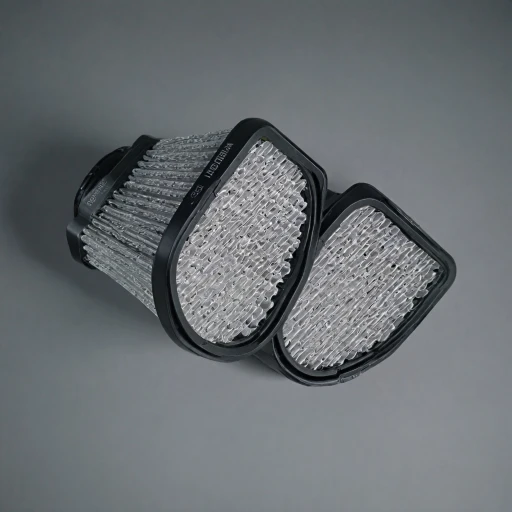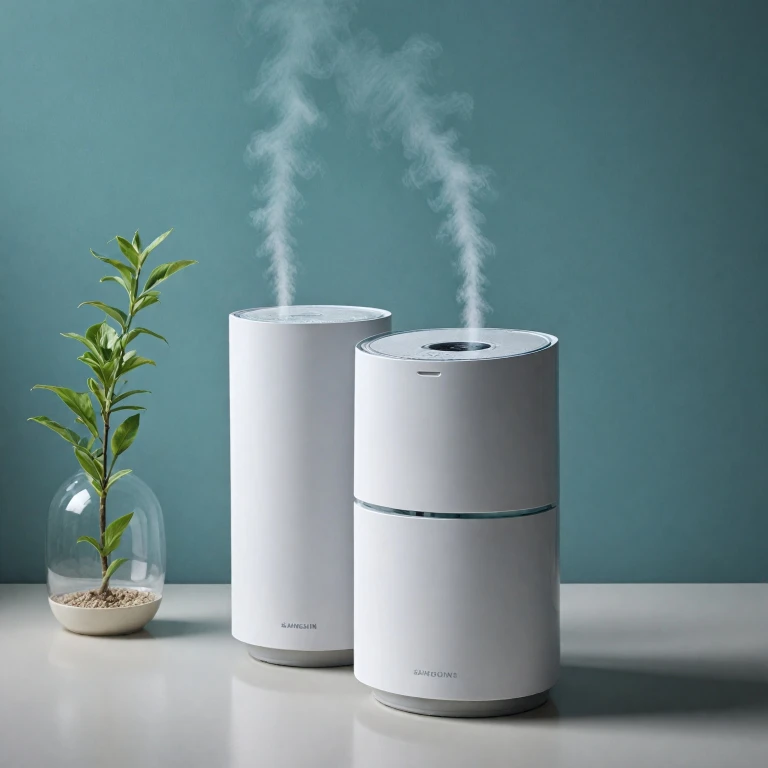The Basics: What Are Air Purifiers and Humidifiers?
The world of air purifiers and humidifiers can be complex, so understanding the essentials of each device is fundamental for making the best choice for your indoor environment.
Exploring the Functionality of Each Device
Air purifiers and humidifiers may seem similar, but they serve very different purposes. An air purifier focuses on filtering airborne particles to improve air quality. These devices often utilize HEPA filters designed to capture pollutants such as dust, allergens, pet dander, and even dust mites, ultimately helping those who suffer from allergies or asthma. HEPA filters are renowned for their ability to trap pollutants effectively and maintain a safe home atmosphere.
On the other hand, a humidifier’s primary goal is to add moisture to the air. This can be especially beneficial in combating dry air that often leads to symptoms like dry skin, and can even reduce complications from respiratory conditions. By balancing humidity levels in a room, humidifiers provide a comfortable and healthy living space.
Both devices help in creating a more pleasant indoor environment, yet their roles are clearly distinct. It's crucial to identify whether your indoor needs are centered on air quality, or if the air feels too dry, to determine the right device that suits your circumstances.
To learn more about achieving clean air tailored to your needs, you might want to explore
this helpful guide on choosing air purifiers.
Key Differences Between Air Purifiers and Humidifiers
Contrasting Functions of Air Purifiers and Humidifiers
When distinguishing between air purifiers and humidifiers, it’s important to understand their core functionalities concerning air quality and moisture levels.
Air purifiers are devices designed to enhance indoor air quality by filtering out pollutants. Equipped with HEPA filters, these purifiers effectively trap allergens, dust mites, pet dander, and other small particles, reducing the presence of potential irritants in the air. This focus on purification is crucial for individuals with allergies or asthma, as it can help alleviate symptoms by providing cleaner air.
On the other hand, humidifiers primarily serve to add moisture to dry air, focusing on adjusting humidity levels indoors. By releasing moisture, these devices help combat dry skin, dry air conditions, and low humidity levels, especially during winter months or in arid climates. This can be particularly beneficial for maintaining comfortable living conditions and protecting wooden furniture or floors from damage due to dryness.
To sum up, while air purifiers significantly contribute to removing air pollutants and ensuring cleaner breathing air, humidifiers are all about adding the right moisture balance indoors. To learn more about selecting suitable air cleaners for specific environments, check out this guide on
choosing the right air cleaner for your basement. This difference in focus is a critical factor to consider when choosing a suitable device for your home.
Benefits of Using an Air Purifier
The Advantages of Using Air Purifiers
Air purifiers have become an essential tool for enhancing indoor air quality, especially for those who suffer from allergies or asthma. Their ability to filter out various pollutants and allergens makes them a valuable addition to any home. Here are some key benefits they offer:
- Removes Allergens and Pollutants: Air purifiers are equipped with filters, such as HEPA filters, that are highly effective in trapping allergens like dust mites, pet dander, and pollen. This can significantly improve indoor air quality and help reduce allergy symptoms.
- Reduces Respiratory Issues: By filtering out pollutants, air purifiers help alleviate symptoms of respiratory conditions. This is particularly beneficial for individuals with asthma, as clean air can mitigate asthma attacks and improve overall breathing.
- Eliminates Odors: Many air purifiers come with activated carbon filters that can absorb and neutralize odors from cooking, smoking, or pets, ensuring fresh and clean air indoors.
- Decreases Risk of Airborne Diseases: By capturing airborne bacteria and viruses, air purifiers can help reduce the spread of illnesses, creating a healthier environment, especially during flu seasons.
- Improves Sleep Quality: With fewer allergens and dust particles in the air, air purifiers contribute to a more restful sleep, which is crucial for overall health and well-being.
For those seeking to enhance their living conditions and maintain high air quality, air purifiers are indeed a beneficial investment. Furthermore, when considering whether to purchase or perhaps even rent an air cleaner,
exploring the benefits of renting an air cleaner can provide valuable insights into making the best choice for your needs.
Benefits of Using a Humidifier
Advantages of Employing a Humidifier
Using a humidifier to improve indoor air quality yields several benefits, particularly if you reside in an area prone to dry air. As indoor heating systems operate during colder months, humidity levels often plummet, leading to an array of inconveniences.
- Moisturizing Dry Air: Humidifiers effectively add moisture to the air, combating the dryness that can lead to discomforts such as dry skin, chapped lips, and irritated nasal passages. Restoring moisture to the air creates a more comfortable living environment.
- Relieving Allergies and Asthma Symptoms: While air purifiers excel in removing pollutants like allergens and dust mites, humidifiers can help ease allergy and asthma symptoms by maintaining optimal moisture levels. The added humidity can reduce nasal congestion, soothing respiratory passages.
- Preventing Damage to Wooden Furnishings: Maintain appropriate humidity levels to protect wooden furniture and flooring, which are prone to drying out and sustaining damage when exposed to low humidity.
- Improving Sleep Quality: Sleep can be hindered by dry air that exacerbates snoring or leads to throat irritation. By ensuring a humidified environment, humidifiers contribute to better sleep quality.
As noted, air purifiers and humidifiers serve different purposes; understanding what each device offers can guide your choice in selecting the best for your needs. While purifiers focus on filtering out pollutants with mechanisms like HEPA filters, humidifiers primarily add moisture to enhance comfort and air quality.
Choosing the Right Device for Your Needs
Selecting the Device that Best Suits Your Needs
When deciding between an air purifier and a humidifier, it’s important to first understand your specific needs, as each device serves a different purpose and benefits indoor air quality uniquely.
For individuals battling allergens like dust mites, pet dander, or other pollutants, an air purifier could be the optimal choice. These devices use HEPA filters to capture tiny particles, improving the air quality and helping to alleviate symptoms associated with allergies and asthma. If maintaining clean air is your priority, air purifiers are designed specifically to trap allergens and pollutants, making them best suited for allergy sufferers or those living in areas with high levels of air pollution.
In contrast, if you reside in an area with low humidity levels or suffer from dry skin and respiratory issues due to dry air, a humidifier could be more advantageous. Humidifiers add moisture to the air, helping to maintain optimal humidity levels, which can prevent dry skin and alleviate discomfort in nasal passages.
For homes where both purification and moisture balance are concern, some might consider a device that combines both functionalities. These purifier-humidifier combos provide the benefits of both devices: filtering out allergens while adding necessary moisture.
To make an informed decision, assess your environment's air quality, whether it's dry or polluted, and consider any specific health needs you may have. Balancing these aspects will lead you to a device—whether it’s an air purifier, a humidifier, or a combination unit—that best meets your requirements.
Common Misconceptions and FAQs
Unraveling Myths and Clearing Doubts
When diving into the world of air purifiers and humidifiers, it's easy to find yourself amidst a sea of misconceptions. Let's clear up some common confusions:
- Air Purifiers Cure Allergies: While purifiers with HEPA filters are renowned for reducing pollutants such as dust mites and pet dander, they don't cure allergies. They help in managing symptom severity by cleaning indoor air and removing allergens.
- One Device Does It All: Many people assume that a single device can both cleanse air and maintain humidity levels. However, purifiers humidifiers serve distinct purposes. An air purifier targets pollutants, whereas a humidifier adds moisture to combat dry air and helps alleviate dry skin.
- Filters Never Need Replacement: This is a key misunderstanding. HEPA filters have a crucial role in maintaining air quality, as seen in how air purifiers operate. Regular filter replacement is vital to ensure the device's optimal performance, especially in environments with high levels of indoor pollutants.
- Humidity Levels Don't Matter: Consistent humidity levels are essential for a comfortable home environment. While purifiers focus on clean air, humidifiers are essential in managing indoor moisture levels, especially in areas prone to dry air.
Understanding these distinctions and functions can guide you in choosing the best appliance for your specific needs, ultimately leading to improved air quality in your home.

